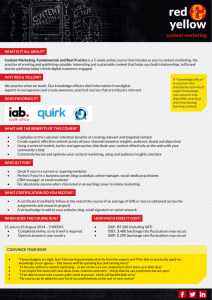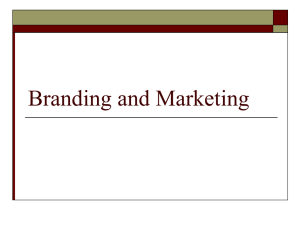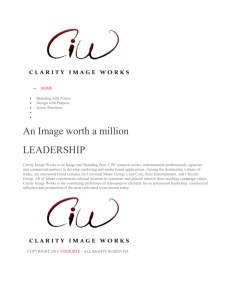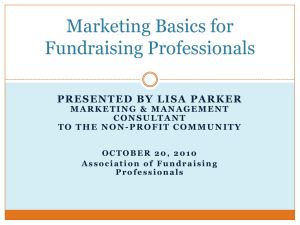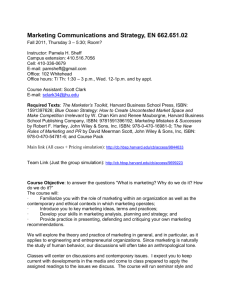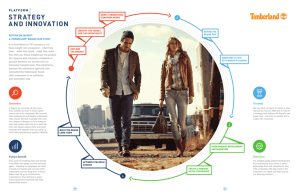Cottle-Taylor: Expanding the Oral Care Group in India
advertisement
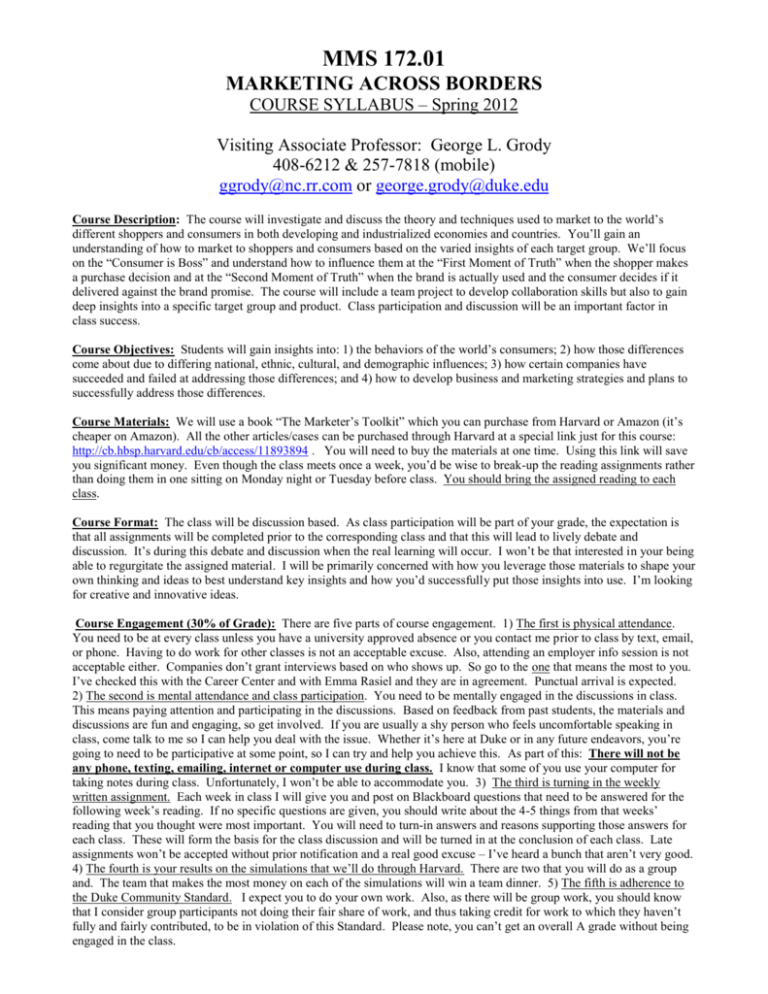
MMS 172.01 MARKETING ACROSS BORDERS COURSE SYLLABUS – Spring 2012 Visiting Associate Professor: George L. Grody 408-6212 & 257-7818 (mobile) ggrody@nc.rr.com or george.grody@duke.edu Course Description: The course will investigate and discuss the theory and techniques used to market to the world’s different shoppers and consumers in both developing and industrialized economies and countries. You’ll gain an understanding of how to market to shoppers and consumers based on the varied insights of each target group. We’ll focus on the “Consumer is Boss” and understand how to influence them at the “First Moment of Truth” when the shopper makes a purchase decision and at the “Second Moment of Truth” when the brand is actually used and the consumer decides if it delivered against the brand promise. The course will include a team project to develop collaboration skills but also to gain deep insights into a specific target group and product. Class participation and discussion will be an important factor in class success. Course Objectives: Students will gain insights into: 1) the behaviors of the world’s consumers; 2) how those differences come about due to differing national, ethnic, cultural, and demographic influences; 3) how certain companies have succeeded and failed at addressing those differences; and 4) how to develop business and marketing strategies and plans to successfully address those differences. Course Materials: We will use a book “The Marketer’s Toolkit” which you can purchase from Harvard or Amazon (it’s cheaper on Amazon). All the other articles/cases can be purchased through Harvard at a special link just for this course: http://cb.hbsp.harvard.edu/cb/access/11893894 . You will need to buy the materials at one time. Using this link will save you significant money. Even though the class meets once a week, you’d be wise to break-up the reading assignments rather than doing them in one sitting on Monday night or Tuesday before class. You should bring the assigned reading to each class. Course Format: The class will be discussion based. As class participation will be part of your grade, the expectation is that all assignments will be completed prior to the corresponding class and that this will lead to lively debate and discussion. It’s during this debate and discussion when the real learning will occur. I won’t be that interested in your being able to regurgitate the assigned material. I will be primarily concerned with how you leverage those materials to shape your own thinking and ideas to best understand key insights and how you’d successfully put those insights into use. I’m looking for creative and innovative ideas. Course Engagement (30% of Grade): There are five parts of course engagement. 1) The first is physical attendance. You need to be at every class unless you have a university approved absence or you contact me prior to class by text, email, or phone. Having to do work for other classes is not an acceptable excuse. Also, attending an employer info session is not acceptable either. Companies don’t grant interviews based on who shows up. So go to the one that means the most to you. I’ve checked this with the Career Center and with Emma Rasiel and they are in agreement. Punctual arrival is expected. 2) The second is mental attendance and class participation. You need to be mentally engaged in the discussions in class. This means paying attention and participating in the discussions. Based on feedback from past students, the materials and discussions are fun and engaging, so get involved. If you are usually a shy person who feels uncomfortable speaking in class, come talk to me so I can help you deal with the issue. Whether it’s here at Duke or in any future endeavors, you’re going to need to be participative at some point, so I can try and help you achieve this. As part of this: There will not be any phone, texting, emailing, internet or computer use during class. I know that some of you use your computer for taking notes during class. Unfortunately, I won’t be able to accommodate you. 3) The third is turning in the weekly written assignment. Each week in class I will give you and post on Blackboard questions that need to be answered for the following week’s reading. If no specific questions are given, you should write about the 4-5 things from that weeks’ reading that you thought were most important. You will need to turn-in answers and reasons supporting those answers for each class. These will form the basis for the class discussion and will be turned in at the conclusion of each class. Late assignments won’t be accepted without prior notification and a real good excuse – I’ve heard a bunch that aren’t very good. 4) The fourth is your results on the simulations that we’ll do through Harvard. There are two that you will do as a group and. The team that makes the most money on each of the simulations will win a team dinner. 5) The fifth is adherence to the Duke Community Standard. I expect you to do your own work. Also, as there will be group work, you should know that I consider group participants not doing their fair share of work, and thus taking credit for work to which they haven’t fully and fairly contributed, to be in violation of this Standard. Please note, you can’t get an overall A grade without being engaged in the class. Consumer Research Project (35% of Grade): I will form groups of 3-5 students that will be responsible for the group project. Each group will need to create or pick a product/service and then do research on that product to better understand the key consumer insights, important product features and benefits, and the drivers of purchase and repurchase. This will include developing a survey and getting at least 50 responses, you can use my Survey Monkey account or the Duke Qualtrics service, two one-on-one interviews done by each group member, and two concept boards to be discussed during those interviews. At the conclusion of your research each group will turn in a consumer research report. This report should highlight what you’ve learned about the consumer and key insights that would form the basis of a marketing and product plan. I’d expect the paper to be roughly 5 pages long not including the appendix which would include your survey responses and one page from each member on the highlights and verbatims of their one-on-one interviews. I will share with you the format for this paper. The goal of this project is to reinforce that the “Consumer is Boss” and to help you develop a better understanding of consumer research methods. While you will ultimately launch this project in a foreign country, the research can be done locally and with those to whom you have connections. If you can devise a way to do the research with a foreign population you can do that. I will meet with each team as needed to provide training/coaching and to ensure that each team is on-track and making progress. As this requires data gathering and then compilation of that data, if you procrastinate, you’ll have hard time doing this project well. Marketing Plan (35% of Grade): The final project, due on the last day of class, is to take the product/service on which you did research and develop a marketing plan for that product/service in a foreign country. You cannot choose an English speaking country or a country that uses your native language. You will then need to research that country to understand the changes you’ll need to make to your consumer understanding to develop an effective marketing plan. One of the reasons to have you do consumer research in one country and launch in another is that it frequently happens in business. You know your home country very well and then you mistakenly project what you know on a different group of consumers, leading to disaster. Normally you would also do research in that foreign country but we won’t have time for that step, but you should look for consumer differences on the internet. You could also talk to international students at Duke who come from your country of launch. So as part of your plan, you’ll need to highlight the consumer differences between your launch plan and your original research. I will give you a framework for the marketing plan. I’d expect the paper to be 10-15 pages. You will also need to develop and shoot a 30 second commercial or a longer viral video in the language of your launch country and turn it in with a translation. I strongly encourage you to be creative and innovative. Most students in previous editions of this class have enjoyed this project. So have some fun with it. But don’t wait until the last minute to do it – it will be hard to do this during the last week of class. On the last day of class, each group will have 10 to show their video and to give an executive summary of their marketing plan. Office Hours: I don’t have set office hours but am available from 10:00am to 11:00pm seven days a week - just give me a call, text, or email (numbers and address noted above) to set-up. I also frequently do flunches and flinners. I enjoy meeting with you folks and discussing the class materials. Class Assignments January 17 - Introductions, discuss expectations, walk-through syllabus, personal 1-pager, contract January 24 - Research Marketing Research Note on Marketing Strategy Concept Testing Step by Step Guide to Smart Business Decisions Speaker, Kira Chappelle, Google University Programs, & Debra LoCastro, Google Sales and Marketing January 31 – Branding Introductory Note on Marketing Management Marketer’s Toolkit chapters 1-4, 6 Three Questions You Need to Ask About Your Brand Building a Company Without Borders February 7 – Pricing Marketer’s Toolkit chapters 9, 10 Mind Your Pricing Cues Coca-Cola's New Vending Machine: Pricing to Capture Value, or Not? Universal Pricing Simulation - one person from each group will need to register, do the simulation as a group prior to class and be prepared to discuss your results http://cb.hbsp.harvard.edu/cb/access/11798644 Consumer Research Survey Questions & Concepts Boards Completed February 14 – Being Global Making it Overseas Silent Language in Overseas Business Distance Still Matters Marketer’s Toolkit chapters 12 February 21 – China Is it too late to enter China? Google in China The China Rules Herborist: A Chinese Personal Care Brand Goes Abroad February 26 – Latin America (no case write-ups) Colgate Max Fresh Coca Cola Marketing Challenge: The Tuba nas Wars P&G Brazil: 2 ½ turnarounds Procter & Gamble (B): Turning to Success Consumer Research Report Due March 13 – Marketer’s Toolkit chapters 5, 7, 8 Group Marketing Simulation in class - one person from each group will need to register, we will do the simulation in class http://cb.hbsp.harvard.edu/cb/access/11800863 March 20 – India House of Tata: Acquiring a Global Footprint Unilever in India Cottle-Taylor: Expanding the Oral Care Group in India Speaker, Ken Roman, former CEO of Ad Agency Ogilvy & Mather March 27 – Developing World Food Distribution in Russia GENICON: A Surgical Strike into Emerging Markets Procter & Gamble: Children's Safe Drinking Water (A&B) April 3 – Global Branding Samsung: Redefining a Brand Louis Vuitton in Japan L’Oreal: Global Brand, Local Knowledge Draft Outline Final Project April 10 – Global Branding Global Branding of Stella Artois (Product) Red (A&B) How Global Brands Compete Speaker, Charlotte Beers, former CEO of Ad Agency Ogilvy & Mather April 17 Group work on final project, consulting with Grody Draft Video Storyboard April 24 – Final Marketing Plan Due You will show your video and give an executive summary of your marketing plan in class
